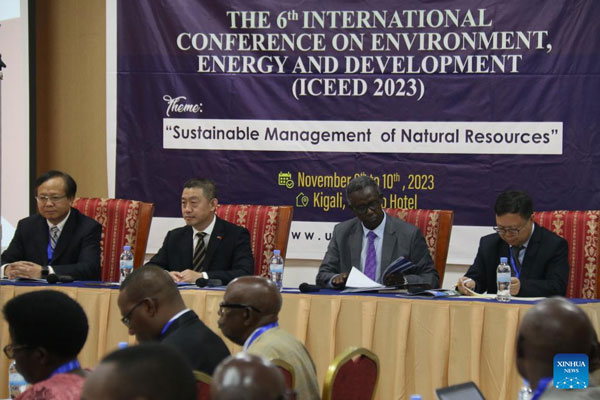
Kigali, Rwanda | Xinhua | The growing impact of climate change requires cooperation to ensure sustainable management of natural resources, Chinese and Rwandan scholars and experts said Wednesday during an international forum on the environment.
The sixth International Conference on Environment, Energy and Development in Kigali, Rwanda’s capital, was co-organized by the University of Lay Adventists of Kigali (UNILAK), the Sino-Africa Joint Research Center of the Chinese Academy of Sciences (CAS), and Xinjiang Institute of Ecology and Geography of the CAS, under the theme of “Sustainable Management of Natural Resources.”
It served as a platform to delve into cutting-edge research and highlight best practices and the most recent technologies designed to preserve the earth’s resources.
“Our world faces unprecedented challenges in maintaining the delicate balance between economic development and environmental preservation. As we witness the growing impacts of climate change, biodiversity loss and resource depletion, it becomes increasingly imperative for us to come together, share our knowledge and forge innovative solutions,” said Jean Ngamije, vice chancellor of the UNILAK.
Ngamije urged international cooperation to “ensure a more sustainable and harmonious relationship between humanity and the planet.”
Opening the conference, Wang Xuekun, the Chinese ambassador to Rwanda, noted that the build-up of ecological civilization is one of the five key areas of China’s national development and an important element of the Chinese path to modernization.
He also acknowledged Rwanda’s commitment to green and sustainable development.
“Our two countries have cooperated in areas of energy and agriculture to advance Rwanda’s sustainable development. I believe we have more to share and cooperate in this area. Today’s conference is a very good occasion for exchange and further discussion,” he said.
Chen Xi, president of the CAS Xinjiang Branch, said the cooperation between the Xinjiang Institute of Ecology and Geography and the UNILAK has enabled training and research projects on climate change and disaster prevention over the last decade.
During the conference, meanwhile, the Rwandan Office of China-Africa Joint Research Center of the CAS was inaugurated to be hosted at the UNILAK.
The Chinese ambassador expressed hope that the office will make an important contribution to Rwanda’s development, China-Rwanda relations, as well as regional academic cooperation. ■
 The Independent Uganda: You get the Truth we Pay the Price
The Independent Uganda: You get the Truth we Pay the Price




Chinese, Rwandan scholars explore ways for sustainable natural resource management
https://www.independent.co.ug/wp-comments-post.php
Certainly! Here’s a relevant comment on Chinese and Rwandan scholars exploring ways for sustainable natural resource management:
—
The collaboration between Chinese and Rwandan scholars to explore sustainable natural resource management is a promising initiative that highlights the importance of international cooperation in addressing global environmental challenges. By sharing expertise, research, and best practices, scholars from both countries can develop innovative solutions tailored to the unique ecological and socio-economic contexts of their regions. This partnership underscores the critical need for sustainable practices that balance economic development with environmental preservation. The joint efforts will not only enhance the capacity for resource management in Rwanda but also contribute to broader global sustainability goals. Such cross-border collaborations are essential for fostering a more sustainable and resilient future.
—
This comment emphasizes the significance of the collaboration and its potential impact on sustainable resource management.